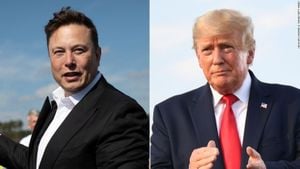President-elect Donald Trump is making waves once again as he unveils his nominees for key positions within his administration, signaling potential shifts in U.S. foreign policy. With his selection of Pete Hegseth for the Secretary of Defense and Marco Rubio for Secretary of State, it appears Trump is setting the stage for some significantly altered dynamics on the global front.
Trump’s announcement of Pete Hegseth—a combat veteran and conservative commentator, widely known for his tenure on Fox & Friends—as his pick for the defense secretary has already stirred controversy. The nomination reflects Trump’s intent to reshape military leadership and emphasizes his commitment to the “America First” agenda. Hegseth, who previously advocated for punitive measures against those he considered ‘woke’ within the military, has expressed skepticism about U.S. support for NATO and Ukraine. Instead, he promotes unyielding backing for Israel, indicating his own interpretation of U.S. foreign commitments.
The response to Hegseth has been mixed, with critics emphasizing his lack of experience compared to previous defense secretaries. Paul Rieckhoff, founder of Independent Veterans of America, labeled him as the “least qualified nominee for SecDef in American history,” setting the tone for expected pushback from certain veteran groups and military analysts as the transition proceeds.
Hegseth’s past remarks have raised eyebrows, particularly those addressing women’s roles within combat units. According to Hegseth, integrating women complicates combat situations, which he believes can lead to increased casualties. His stance on this issue ties back to his wider worldview on military culture and strategy, underscoring the political winds swirling around the Pentagon as he assumes the defense post.
Meanwhile, Donald Trump dispatched Marco Rubio, the Florida senator known for his hawkish foreign policy stance, to be the nation’s top diplomat. Rubio's nomination suggests Trump aims to maintain, if not strengthen, the U.S. stance against its primary global adversaries—specifically, China and Iran. Rubio’s previous critiques of China have earned him both respect and disdain, illustrating the divided views within political circles about how to handle rising Chinese influence.
During past terms, Rubio demonstrated his commitment to tough trade policies against China and voiced concerns over their growing economic power. His aggressive approach aligns closely with Trump's own and may signal continuity in dealings with Beijing, particularly concerning tariffs and strategic industries.
Iran, another focal point of concern for both Trump and Rubio, is poised for continued tension. Rubio has expressed ambivalence about the diplomatic approaches taken with Iran, oscillated between hardline opposition to President Trump’s prior withdrawal from the Iran nuclear deal and open criticism against any softening of negotiations. Should new talks emerge, they may not sit well with Israel, which views any concessions to Iran as threats to regional security.
Rubio's foreign policy sentiments also hint at potential shifts concerning Ukraine. There’s growing concern among allies and analysts alike as it appears the incoming administration may adopt a more isolationist approach in relation to Ukraine, which is currently under siege by Russian forces. Expected negotiations may push Ukraine to concede occupied territories as part of any peace deal—something which worries many observers who see the region’s stability hanging by a thread.
While Trump had previously promised to re-evaluate U.S. commitments abroad, Rubio’s selection seems intended to assuage allies’ fears about the U.S. retreating from the international stage. Statements made by Rubio indicate he recognizes the interconnected nature of current global adversaries, speaking to the need for cooperative foreign policy rather than isolationism. This aligns with the mantra of pragmatic engagement, especially as he frames the situation with Russia, North Korea, and Iran as requiring united U.S. policy focus.
Adding another layer to this foreign policy puzzle is the U.S.-China rivalry, which is likely to play out more intensively under this administration. Experts are divided on how Trump's second term might affect China’s presence and influence on the African continent. Some argue a more isolationist stance could benefit China, granting it leeway to expand its economic initiatives and partnerships across the region.
Tibor Nagy, former Assistant Secretary of State for African Affairs, believes Trump’s administration acknowledged China's growing power and recognized the significance of Africa concerning U.S. interests, such as access to strategic minerals. Discussions around initiatives like Prosper Africa, which aimed to bolster American business interests on the continent, hint at continuity from the past administration.
Conversely, some analysts express skepticism about Trump's interest levels toward Africa, foreseeing the potential for China to fill any void left as the U.S. may downsize its strategic involvement. Tensions within this arena are high, and fears abound over how these alignments will affect democratic processes and governance throughout the continent. The Trump administration will need to engage Africa smartly, especially as nations navigate the pull between U.S. and Chinese influence.
All eyes are on the incoming administration to see how its actions will redefine America's role on the world stage. The combination of Hegseth and Rubio signals not just appointments but directional shifts—both symbolic and practical. These changes may reveal how the next Trump administration will tackle key threats and seize opportunities, whether within military engagements, trade negotiations, or diplomatic initiatives.



